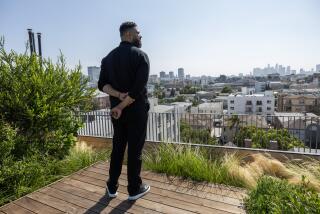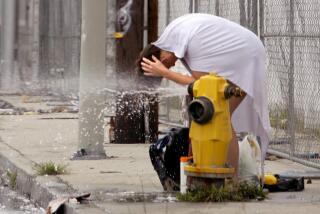AIDS Hospice Opens in South L.A.
- Share via
Hailing it as “a ray of hope” in the struggle against an unrelenting plague in minority communities, health activists opened a long-awaited AIDS hospice in South-Central Los Angeles on Monday.
“Today the most basic right of death with dignity has come to South-Central Los Angeles,” AIDS Healthcare Foundation President Michael Weinstein told a crowd of 200, who braved the hot sun to celebrate the opening. “In the midst of a sense of hopelessness in Los Angeles in the last year, here’s a ray of hope.”
For the record:
12:00 a.m. Sept. 23, 1992 For the Record
Los Angeles Times Wednesday September 23, 1992 Home Edition Metro Part B Page 3 Column 5 Metro Desk 1 inches; 29 words Type of Material: Correction
AIDS, riot charts--In some Tuesday editions of The Times, placement of graphics dealing with the incidence of AIDS in minority communities and with federal grants for riot-affected areas was reversed.
The 25-bed facility will accept terminal AIDS patients from throughout the county, but will emphasize service to community residents, most of whom are African-American or Latino with little access to medical services, Weinstein said.
African-Americans and Latinos account for 16% and 21%, respectively, of all AIDS cases countywide. But while the rate among other ethnic groups has stabilized or decreased in recent years, the rate among Latinos has been increasing steadily.
“This should have happened a long time ago, but at least it’s here now,” said Eric Horton, 26, who will become one of the center’s first three patients early next month. “Places like this show that even in such terrible adversity you can make a difference.”
The center, on West Adams Boulevard near Western Avenue, will use the restored turn-of-the-century Wells Halliday mansion for community rooms. A recently completed two-story building located behind the mansion will house patients. The facility includes a kitchen, bathrooms and storage space. Each private room has a sink and a bed.
First proposed four years ago, the $3.75-million Carl Bean AIDS Care Center was built with a patchwork of city, county, state, federal and private funds that slowed the project down at various stages.
“This is a significant moment in the history of this city,” City Councilman Mark Ridley-Thomas said at Monday’s ceremony. “Our work cannot stop with the building of this particular center. Part of rebuilding Los Angeles is rebuilding the human infrastructure of the city--and AIDS sufferers are an important part of that.”
The hospice is named after Bean, pastor of Unity Fellowship Church in South Los Angeles and founder of the Minority AIDS Project. At Monday’s dedication, he told the assembled crowd--which included some former gang members whom he counsels--that he had had a troubled life before he came to terms with his sexuality.
“I want you to know, I used wine and whiskey . . . heroin . . . even sold my body because I was different,” said Bean, who is gay. “I don’t care how poor you are or what little you have . . . I want you to keep on walking, keep on talking. Accept yourself.”
The center will provide an alternative to hospital care for AIDS patients in their last few months of life. A doctor and nurses will be on staff, and the center will also provide counseling for AIDS patients and their loved ones, clergy services and other activities on a 24-hour, seven-day-a-week basis.
The hospice, which will accept all terminal AIDS patients regardless of whether they have MediCal or private insurance, will admit its first patient in about two weeks when it receives its final health licenses, Weinstein said.
The operator, the AIDS Healthcare Foundation, runs two other AIDS hospices in the county, at Elysian Park and in the San Fernando Valley at Valley Presbyterian Hospital.
Lucille Renwick contributed to this story.
Aid for Riot-Torn Areas
The U.S. Department of Housing and Urban Development awarded a total of $4 million to Los Angeles County and seven cities to support economic development efforts in the wake of the riots. Los Angeles County: $1,052,631 City of Los Angeles: $1,052,631 Long Beach: $491,228 Compton, Hunt. Park, Inglewood, Lynwood, Pasadena: each $280,702 Source: Housing and Urban Development Department
AIDS Among Blacks and Latinos
From 1981 to Aug. 31, a total of 16,129 AIDS cases were reported in Los Angeles County. Of that figure, blacks accounted for 2,635 cases, or 16%, and Latinos accounted for 3,381 cases, or 21%.
Total AIDS Cases 1988: 2,247 1989: 2,501 1990: 2,656 1991: 2,513 1992: 920* * Through Aug. 31
Source: L.A. County Dept. of Health Servies, AIDS Program Office
Compiled by researcher Tracy Thomas
More to Read
Sign up for Essential California
The most important California stories and recommendations in your inbox every morning.
You may occasionally receive promotional content from the Los Angeles Times.













